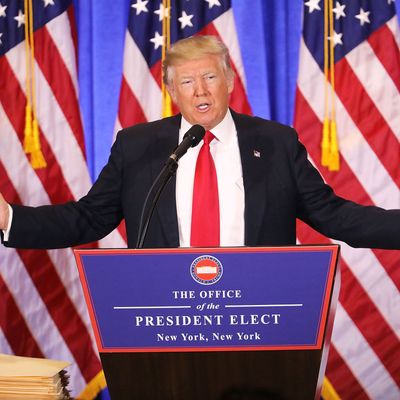
Going into today’s extraordinary press conference by Donald Trump, an urgent issue journalists expected to get a clarification about were the president-elect’s thoughts on how congressional Republicans could deal with Obamacare. They did get some more words from Donald Trump on that subject, although they raised as many questions as they answered; that’s a subject for a different post.
What nobody expected was this effort in health-care policymaking on the fly, emanating not from any question but from a Trump tangent on his badgering of companies that outsource jobs:
I think a lot of industries are going to be coming back [to the U.S.] We have to get our drug industry coming back. Our drug industry has been disastrous. They’re leaving left and right. They supply our drugs, but they don’t make them here. To a large extent. And the other thing we have to do is create new bidding procedures for the drug industry because they’re getting away with murder.
Pharma has a lot of lobbies, a lot of lobbyists and a lot of power. And there’s very little bidding on drugs. We’re the largest buyer of drugs in the world, and yet we don’t bid properly. And were going to start bidding and were going to save billions of dollars over a period of time.
That is, to put it mildly, rank heresy to market-oriented conservatives. It’s by no means the first time Trump has talked about drug-price negotiations; he alarmed Republicans with talk about it during the campaign. But he and his people haven’t raised a peep about it since the election, and some reports suggested pharma was very plugged into the upcoming administration’s health-care-policy process.
It sure looks like pharma was blindsided. In an experience an awful lot of industries are going to have to begin anticipating as a possibility, the stocks of pharmaceutical and biotech companies went into freefall after Trump’s threatening remarks hit the wires:
Plunging too must have been the hearts of congressional Republicans who must now figure out if Trump was serious about any of his remarks on health-care policy today, and then scramble to adjust.






























